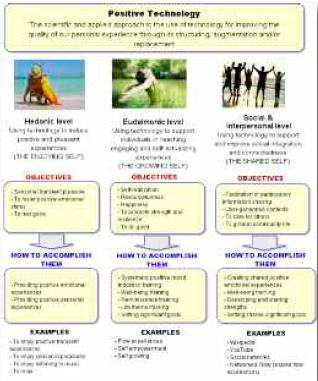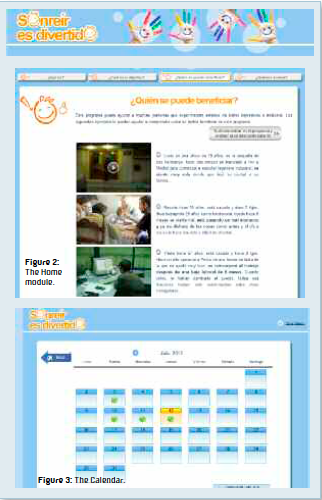By Adriana Mira et al.
Emotional disorders are prevalent mental disorders associated with significant disability and economic costs. According to the World Health Organization, depression will become the second most important cause of disability in 2020. These people, who are suffering from emotional disorders often use maladaptive emotion regulation strategies and have low coping behaviour. For this reason, it is important to develop strategies for monitoring coping, to promote emotion regulation and personal well-belling in people exposed to high levels of stress. ICTs (Virtual Reality, the Internet, etc.) can help us in this task, specially technology designed to improve the quality of the personal experience, which in turn serves to promote wellness and generate resources and strengths in individuals (PT). PT will be classified according to their effects on three features of personal experience (Figure 1).

Figure 1: Positive Technology: Levels of positive human functioning using ICT tools and Positive Psychology goals.
Very few applications exist that can be included within the PT conceptual framework. Sonreír es Divertido is an example on these applications focused on the second level of the PT (Eudaimonic level). It is an internet-delivered, multimedia, interactive, self-help program for emotional disorders that tries to combine the most effective existing psychological procedures for stress management with strategies to promote emotion regulation, coping capacity and resilience. It is based on classical CBT techniques, as behavioural activation. However, it also includes other psychological strategies to improve positive mood designed to support individuals in reaching engaging and selfactualizing experiences.
The program includes a Home module (Figure 2), a Welcome module, and eight treatment modules designed to help learning various psychological techniques that allow users to learn and practice adaptive ways to cope with depression and daily problems, focusing on the importance of generating positive emotions, promoting the involvement in pleasant and significant activities, contact with other people, understanding the importance of identifying and boost the individual’s psychological strengths, and selecting meaningful activities linked to values and goals in life.
The program uses three essential transversal tools: 1) Activity report. It helps the user seeing that his mood, coping, and stress are related to the activities performed. 2) “How am I?” That offers a set of graphs to chart the user’s progress along the whole program. 3) The Calendar. That provides feedback to the users regarding homework and tasks already achieved (Figure 3).
Currently, the efficacy of this program is being evaluated in a between-group design study. We hope to provide data regarding the efficacy of this program and the role of the modules designed to promote positive affect contributing to the new PT paradigm.
Adriana Mira Cristina Botella Azucena Garcia- Palacios Antonio Riera López del Amo Soledad Quero Universitat Jaume I
Mariano Alcañiz Universidad Politécnica de Valencia
Rosa Maria Banños Universidad de Valencia Spain botella@uji.es
About Brenda Wiederhold
President of Virtual Reality Medical Institute (VRMI) in Brussels, Belgium.
Executive VP Virtual Reality Medical Center (VRMC), based in San Diego and Los Angeles, California.
CEO of Interactive Media Institute a 501c3 non-profit
Clinical Instructor in Department of Psychiatry at UCSD
Founder of CyberPsychology, CyberTherapy, & Social Networking Conference
Visiting Professor at Catholic University Milan.










